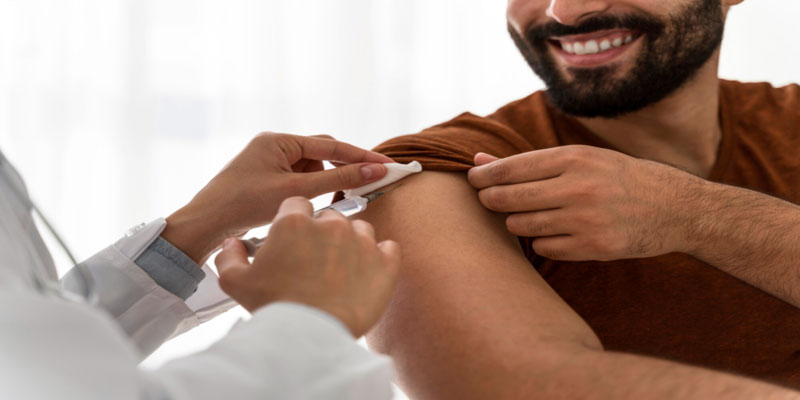Menstrual migraines and period headaches are two names for the same condition, which affects women just before and during their periods. These headaches may be intense and accompanied by additional symptoms such as nausea, vomiting, and sensitivity to light and sound. Hormonal fluctuations, genetic predisposition, and environmental and lifestyle variables have all been linked to the onset of period headaches, but the exact reasons remain unknown. Preventing period headaches may be tough, but various measures may assist, including hormonal contraceptives, migraine drugs, and good lifestyle practices. If avoidance is not feasible, numerous treatments for controlling period headaches are also available, including over-the-counter pain medicines, cold compresses, rest, and relaxation techniques.
Causes Of Menstrual Pain
Hormonal shifts, genetics, and even one's way of life might all play a role in the onset of menstrual headaches.
Hormonal Changes
One of the most prevalent reasons for period headaches is the change in hormone levels that happens throughout the menstrual cycle. The female hormones estrogen and progesterone regulate the menstrual cycle, and fluctuations in their levels may alter the frequency and severity of period headaches. Since estrogen levels are typically lowest in the days leading up to and during menstruation, this time of the month may set off a chain reaction in the brain that produces chemicals that aggravate inflammation and pain. In addition, certain women may be more vulnerable to the effects of these hormonal shifts, making them more likely to have period headaches.
Genetics
There may be a hereditary component to period headaches. Period headaches are more common in women with migraines or headaches in their families.
Lifestyle Factors
Period headaches are common, but certain lifestyle choices might increase the risk. Among them are:
- A sleep deficit
- Subpar diet
- Misuse of alcoholic beverages
- Worry and stress
- Smoking
- The Way to Stop PMS Headaches
The following are some of the methods that have shown promise in reducing or eliminating the severity of period headaches:
Hormonal Contraceptives
Period headaches may be alleviated by using hormonal contraceptives like the birth control pill or the patch, which help manage hormone levels and lessen periods' frequency and intensity. By preventing ovulation, as these contraceptives do, hormone levels are kept more consistent, reducing the erratic changes that might cause period headaches.
Migraine Medications
Migraine drugs like triptans and period headache treatments like ergots have certain similarities. These drugs reduce inflammation and discomfort by inhibiting the brain's production of specific molecules.
Healthy Lifestyle Habits

Adopting a healthy lifestyle is a good place to start if you want to avoid getting headaches during your period. Ample rest, nutritious meals, moderate alcohol intake, and stress and anxiety management are all part of this. The frequency and intensity of period headaches may be mitigated by regular exercise.
Managing Period Headaches
If you suffer from period headaches and can't seem to stop them, there are some things you can do. Among them are:
Over-The-Counter Pain Medications
Period headaches may be treated with over-the-counter pain relievers such as acetaminophen, ibuprofen, or aspirin. Make sure you take the medication exactly as directed and avoid taking it anymore.
Cold Compresses
Try placing a cold compress on your forehead or the back of your neck to alleviate discomfort and inflammation. A cold pack or ice cubes in a towel may be applied to the region of pain.
Rest
Period headaches are easier to handle if you get enough shut-eye. Do all you can to get some shut-eye, and if that's not an option, nap throughout the day. Turn down the lights, reduce the volume, and eliminate any other potential sources of disruption.
Relaxation Techniques

Reducing stress and tension may be accomplished by using relaxation techniques such as deep breathing, meditation, and progressive muscle relaxation. Period headaches have been related to causes like stress and tension. Relaxation techniques such as deep breathing, meditation, and progressive muscle relaxation may all aid in alleviating anxiety and stress.
Conclusion
In conclusion, many women suffer from the incapacitating pain of a headache during their period. Hormonal shifts, heredity, and lifestyle choices are all suspected contributors, but no one knows what causes severe headaches. Hormonal contraceptives, migraine drugs, and leading a healthy lifestyle are just a few of the methods that have shown promise in reducing the frequency and severity of period headaches. Suppose you can't avoid getting a period headache. In that case, there are several things you may do to alleviate the discomfort, including over-the-counter pain relievers, cold compresses, rest, and relaxation techniques. Women may take charge of their health and lessen the severity of period headaches by learning more about what causes them and what they can do to lower their risk.




